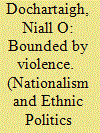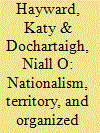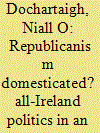|
|
|
Sort Order |
|
|
|
Items / Page
|
|
|
|
|
|
|
| Srl | Item |
| 1 |
ID:
127707


|
|
|
|
|
| Publication |
2013.
|
| Summary/Abstract |
This article analyzes the relationship between territoriality and organized violence through an examination of two relatively understudied aspects of the production and reproduction of informal territorial boundaries in situations of violent conflict. It looks first at the role of the state in the establishment, maintenance, and institutionalization of substate territories associated with challengers, outlining how these bounding processes are generated through interaction between the state and challengers, rather than primarily through the actions of challengers. Secondly, it explores the shaping force of geopolitical contexts on the everyday maintenance of informal boundaries in conflict situations. The argument is illustrated with examples from the most recent period of violent conflict in the north of Ireland, drawing on a range of primary sources, including official and private papers. The article argues that an analysis that gives due recognition to the central role of the state and the importance of the geopolitical context in the delineation and institutionalization of substate territories associated with armed challengers can help us to better understand the dynamics of organized violence.
|
|
|
|
|
|
|
|
|
|
|
|
|
|
|
|
| 2 |
ID:
127654


|
|
|
|
|
| Publication |
2013.
|
| Summary/Abstract |
Recent decades have seen significant advances in research on the relationship between nationalist ideology and organized violence. New scholarship has paid much closer attention to the microdynamics of violence, the strikingly uneven distribution of violence, the relationship between master cleavages and intimate local and personal struggles, and to process, history, and contingency. Nationalist ideology is understood to be bound up intimately with institutions and with everyday relationships at the local level. We introduce the contributions to this special issue, outlining the way in which they highlight the power of ideas, narratives, and microlevel solidarity in mobilization for violence and how they address the crucial importance of territoriality in linking ideas and action.
|
|
|
|
|
|
|
|
|
|
|
|
|
|
|
|
| 3 |
ID:
087484


|
|
|
|
|
| Publication |
2009.
|
| Summary/Abstract |
This article examines one initiative aimed at taking advantage of new technologies to build new transnational connections between a political movement in the "homeland" and a diaspora population in the United States. It analyzes an initiative by Ulster loyalists in Northern Ireland to mobilize Americans of Ulster Protestant descent in support of their cause, while simultaneously attempting to undermine the American support base of their Irish nationalist opponents. By contrast with Irish nationalists, Ulster loyalists have never had significant support networks in the United States. This attempt to mobilize a distant diaspora has met with little success. This article argues that loyalist understandings of their imagined audience in the United States are built on a misleading caricature of Irish-American support networks for Irish republicans. These misunderstandings direct loyalists towards a strategy that places undue weight on the role of homeland propaganda in converting shared ancestry into political support for ethnic compatriots in the "homeland" to the neglect of more fundamental factors in the mobilization of transnational support networks. The article argues that new technologies are of minimal significance for the mobilization of transnational support networks on the basis of shared ancestry in the absence of other fundamental conditions for mobilization. However, the new technologies allow movements to learn more about distant and little-understood support pools. The reflexive character of online interaction is illustrated by the way in which at least some loyalists have begun to explore other bases for transnational co-operation.
|
|
|
|
|
|
|
|
|
|
|
|
|
|
|
|
| 4 |
ID:
112070


|
|
|
|
|
| Publication |
2012.
|
| Summary/Abstract |
This paper examines some of the key factors working in favour of mutual insulation between the two political jurisdictions in Ireland, factors that contribute to the 'copper-fastening' of partition and that constitute a major obstacle to any Irish Republican project focused on the ending of partition. It outlines the powerful structural forces working for the naturalisation of Northern Ireland as a political unit. It argues that some of these factors are almost entirely independent of political unionism and in certain respects work to copperfasten partition despite the efforts of unionism. It goes on to outline a number of key elements that work against the mutual insulation of the jurisdictions and the domestication of Irish Republican and nationalist politics in a Northern Ireland context, factors that continue to pull the North back into an all-Ireland context despite all of the powerful structural factors working to mutually insulate the politics of the two jurisdictions.
|
|
|
|
|
|
|
|
|
|
|
|
|
|
|
|
| 5 |
ID:
109194


|
|
|
|
|
| Publication |
2011.
|
| Summary/Abstract |
This article examines the development of cooperative relationships in back-channel communication and their impact on intraparty negotiation. It draws on extensive newly available evidence on back-channel communication in the Irish peace process to expand the range of detailed case studies on a topic which is shrouded in secrecy and resistant to academic inquiry. The article analyses the operation of a secret back channel that linked the Irish Republican Army to the British government over a period of 20 years, drawing on unique material from the private papers of the intermediary, Brendan Duddy, and a range of other primary sources. The article finds that interaction through this back channel increased predictability and laid a foundation of extremely limited trust by providing information and increasing mutual understanding. Strong cooperative relationships developed at the intersection between the two sides, based to a great extent on strong interpersonal relationships and continuity in personnel. This in turn produced direct pressure for changes in the position of parties as negotiators acted as advocates of movement in intraparty negotiations. The article finds that this back channel was characterized by a short chain, the direct involvement of principals and the establishment of a single primary channel of communication and that these features combined with secrecy to generate the distinctive cooperative dynamics identified in this article. It concludes that the potential for the development of cooperative relationships is particularly strong in back-channel negotiation for two reasons; first, the joint project of secrecy creates an ongoing shared task that builds trust and mutual understanding regardless of progress in the negotiations. Secondly, as a shared project based on the explicit aim of bypassing spoilers, the process creates structural pressures for cooperation to manage internal opponents on both sides, pressures intensified by the secrecy of the process.
|
|
|
|
|
|
|
|
|
|
|
|
|
|
|
|
|
|
|
|
|